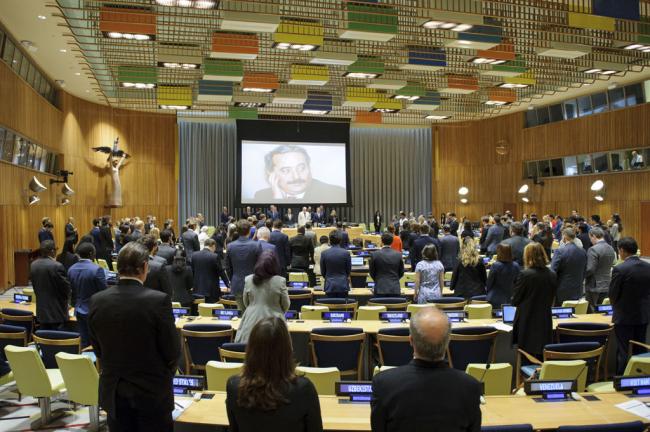
UN Assembly honours legacy of slain Italian judge, hears calls to bolster fight against organized crime
“Criminals exploit inequality and vulnerability, and profit from gaps in development and enforcement,” Yury Fedotov, Executive Director of the UN Office on Drugs and Crime (UNODC), told a High-Level meeting General Assembly meeting in New York to honour Giovanni Falcone, the judge killed in 1992 by a massive roadside bomb planted in Sicily by the Mafia.
“But there is nothing inevitable or invincible about transnational organized crime. We must engage all of our institutions if we hope to defeat the criminals and protect the defenceless,” he added.
The special meeting also focused on the implementation of the UN Convention against Transnational Organized Crime – widely known as the Palermo Convention – and the Protocols thereto and highlighted emerging trends and challenges in crime prevention and criminal justice and their impact on sustainable development.
Falcone's assassination galvanized the international community's efforts in this regard and led to the adoption of the Palermo Convention, which came into force in December 2003, and has 187 States Parties on Monday. UNODC is the guardian of the treaty.
“A quarter of a century after his assassination, we need renewed commitment and common purpose more than ever to counter evolving and emerging forms of organized crime,” Fedotov said, noting that such efforts include building capacities, investing resources and creating and strengthening transparent and accountable institutions of law enforcement and justice.
In addition, there is a need to invest in prevention and education, and involve young people and civil society, he said.
For his part, General Assembly President Peter Thomson said that, in the years that have followed the adoption of the Palermo Convention, the Assembly passed a series of resolutions that have added to the tools to prevent crime and pursue criminal justice.
But with criminal groups having been quick to embrace sophisticated new techniques that have changed the world, he said “It is imperative therefore that we continue to build upon Judge Falcone's legacy by exploring options to enhance our existing legal frameworks – particularly in light of the barbarous acts of terrorism that are being perpetrated across our world.”
“Judge Falcone understood that crime can thrive when education, hope and opportunity is lost,” continued the Assembly President, underscoring: “Therefore, we must ever examine ways to strengthen our efforts to combat organized crime, to strengthen rule of law, and to bring international criminals to justice.”
Other speakers were also expected to include: the Chair of the 26th session of the Commission on Crime Prevention and Criminal Justice (CCPCJ) and Ambassador and Permanent Representative of Japan to the UN (Vienna), Mitsuru Kitano; and President of 8th Conference of the Parties to the UN Convention on Transnational Organized Crime (UNTOC) and Ambassador and Permanent Representative of Costa Rica to the United Nations (Vienna), Pilar Saborio de Rocafort and the Italian Minister of Justice Andrea Orlando.
Credit: UN Photo/Manuel Elias
Source: www.justearthnews.com
Support Our Journalism
We cannot do without you.. your contribution supports unbiased journalism
IBNS is not driven by any ism- not wokeism, not racism, not skewed secularism, not hyper right-wing or left liberal ideals, nor by any hardline religious beliefs or hyper nationalism. We want to serve you good old objective news, as they are. We do not judge or preach. We let people decide for themselves. We only try to present factual and well-sourced news.







